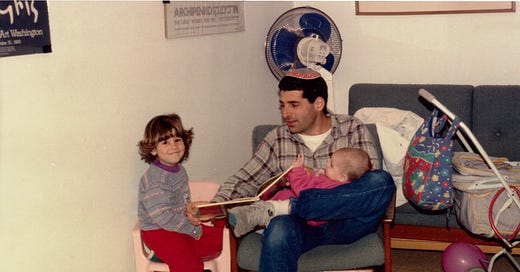This is an English translation of my annual dvar Torah for Pesach in memory of my son Niot z”l, whom we lost fourteen years ago during Pesach. The Hebrew original appears in this week’s online edition of Shabbat Shalom, the weekly Torah sheet published by Oz Veshalom, the religious peace movement. A pdf of the Hebrew version can be downloaded here.
“Rabba bar bar Ḥana says that Rabbi Yoḥanan says: It is as difficult to match a couple as the splitting of the Red Sea” (Babylonian Talmud, Sanhedrin 22a).
This statement, often heard at weddings, appears in the Gemara in a series of aphorisms of the Sages, but the general subject is not bringing a couple together but rather the severance of such a connection by death or divorce.
The image is surprising. What’s the connection with the splitting of the Red Sea? That, ostensibly, is a miracle that God, the absolute ruler of the world, does not need to make any special effort to accomplish. While some commentators propose that the word “kasheh,” difficult, should rather be understood as “wondrous” or “impressive,” the context in the Sanhedrin tractate, in a series of sayings about the how difficult it is for a couple to part with each other, clearly the word needs to be read in the generally accepted way.
The description of the splitting of the Red Sea that appears in the Pesach Haggadah makes it sound pretty easy. Psalm 114, verse 3, which we read at the Seder as part of the Hallel, relates that “The sea saw them and fled, Jordan ran backward.” Most commentators understand the verse to be referring to the splitting of the Red Sea at the time of the exodus from Egypt and the parting of the Jordan River at the time the Children of Israel entered the Land of Israel. But in this account the bodies of water seem to be acting on their own, not at God’s behest.
The description in the book of Exodus (14:21) is different: “Then Moses held out his arm over the sea and the Lord drove back the sea with a strong east wind all that night, and turned the sea into dry ground.” On the one hand, this is a miracle that surpasses nature, but note that God does not effect the miracle directly, but rather with the involvement of Moses and by means of the east wind.
This collaboration in the miracle is even more prominent in Midrash Rabbah 21:6. In this telling, God commands Moses to raise his staff, but Moses protests: “You are saying to me that I should split the sea and render the sea dry land, but isn’t it written: I placed the sand as the boundary of the sea [Jeremiah 5:22]?” Here it sounds as if God is seeking to evade one of the laws he himself established at the time of the Creation by delegating the task to Moses. According to the midrash, Moses in the end accedes to God’s directive, but the sea refuses to cooperate: “When he went to split the sea, it was unwilling to take upon itself to split. The sea said to him: ‘I should split because of you? I am greater than you, as I was created on the third [day of creation] and you were created on the sixth.’”
Moses returns to God to report that he has failed. “When Moses heard this, he went and said to the Holy One, blessed by He: ‘The sea refuses to split.’ What did the Holy One, blessed be He do? He placed his right hand on the right hand of Moses … Immediately, it [the sea] saw the Holy One, blessed be He, and fled, as it is stated, ‘The sea saw and fled.’ What did it see? It saw that the Holy One, blessed be He, placed His right hand upon Moses. It could no longer resist, so it fled immediately.”
The midrash concludes by telling us: “That is why the Holy One, blessed be He, praises him, as it is stated ‘He remembered the days of old, Moses, His people: [Where is he who took them up from the sea, the shepherd of His flock?] (Isaiah 63:11),’ and it is written: ‘He caused His glorious arm to go to the right of Moses’ (Isaiah 63:12).”
In this midrash, it sounds like the difficulty in the splitting of the Red Sea is the fact that neither God nor Moses can act alone. God cannot act alone because, if he does so, he violates the natural order that he himself set in place. Neither can Moses act alone because, as a human being, he does not have the authority to dictate to the sea what it should do. They need to act together, hand on hand, hand in hand, like a couple in a loving relationship.
I am writing this on the harsh day on which it was officially announced that Shiri Bibas and her two sons, Kfir and Ariel, are no longer alive. Yarden, Shir’s husband and the boys’ father, remains alone and grief-stricken.
Not long before the statement about the difficulty of matching couples there is another aphorism attributed to Rabbi Yoḥanan: “For any man whose first wife dies, it is as if the Temple were destroyed in his days.”
Like Yarden, many have lost husbands or wives in the horrible war that has raged this last year and a half. Couples who walked hand in hand and acted hand on hand. May they be comforted by heaven.




Thank you Haim-
How appropriate to make the connection with the loss of the Bibas children. Loss is certainly unending.
Beautifully written.